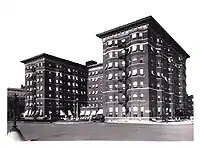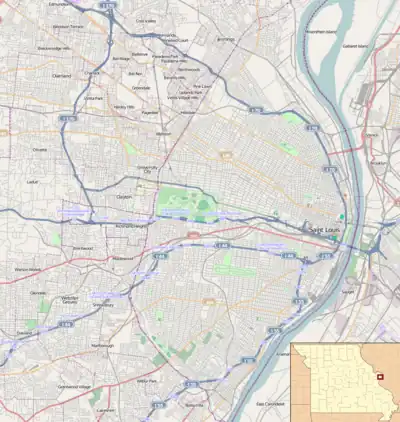Buckingham Hotel
Buckingham Hotel, later the Ambassador Hotel, was an upmarket hotel which existed in St. Louis, Missouri, United States, in the early 20th century. It was located on the northeast corner of North Kingshighway and West Pine boulevards. Built in 1904 to accommodate World's Fair visitors, it was subsequently known as the Ambassador Hotel, which was gutted by fire in 1971 and razed in 1973.[2]
| Buckingham Hotel | |
|---|---|
 Original hotel building | |
 Former location in St. Louis  Buckingham Hotel (the United States) | |
| General information | |
| Location | St. Louis, Missouri |
| Coordinates | 38°38′34″N 90°15′52″W |
| Owner | Buckingham Realty Company[1] |
| Technical details | |
| Floor count | 7 |
| Other information | |
| Number of rooms | 450 |
Architecture
The building was a U-shaped hotel, seven stories high, with bay windows around the wings. The hotel and annex originally offered 450 rooms, 300 of which had baths.[3]
History
Over the years, the hotel was popular with baseball players, commonly providing accommodation for visiting players and as a hang out for drinking and socialising.[4][5] It was at the hotel's bar that the Major League Baseball career of Larry McLean ended during a drunken encounter with his manager, John McGraw.[4] After the St. Louis Society of the Archaeological Institute of America was founded on February 8, 1906, the organizational meetings and many early lectures were held at the hotel.[6] It also hosted meetings of the American Philological Association.[7] In addition, it was a meeting place for other societies, conventions and demonstrations, from a Violinist's Guild's Convention in June 1912 to art galleries and weddings.[8] On January 4, 1917, the notorious hotel master thief Ernest Le Ford was arrested at the Buckingham Hotel after successfully robbing over $50,000 (US$1,142,078 in 2022 dollars[9]) worth of jewels from lavish hotels in New York City.[10]

It was common for guests to live permanently at the hotel,[11] including the hotel's president, Walter James Holbrook.[12] The capitalist Ellis Wainwright died in the hotel in 1924 after living there as a recluse.[13] After 1920, the hotel faced stiff competition from the Chase Hotel, just a block north, and declined in significance. In December 1927, a fire in the hotel's annex led to the death of seven people.[14] The Buckingham Realty Company, which operated the hotel, fell into bankruptcy in 1928, and it sealed the fate of the Buckingham Hotel;[1][15] the intermingled accounts of the Buckingham Hotel Property and the Buckingham Annex constituted part of the problem.[16]
Eventually acquired by the Royale Investment Company, the hotel was sold to attorney Morris Shenker in 1965.[17] It was known as the Ambassador for many years until it was demolished in 1973, after a devastating fire two years earlier.
References
- United States Court of Claims. District of Columbia Court of Appeals (1935). The Federal Reporter. West Pub. Co. p. 518. Retrieved 25 March 2011 – via Google Books.
- St. Louis Chamber of Commerce; Chamber of Commerce of Metropolitan St. Louis; St. Louis Regional Commerce & Growth Association (1980). St. Louis commerce. St. Louis Regional Commerce & Growth Association. p. 238. Retrieved 26 March 2011 – via Google Books.
- International Railway Journal. Vol. 23–24. 1915. p. 68–. Retrieved 26 March 2011 – via Google Books.
- Steinberg, Steve (June 2004). Baseball in St. Louis, 1901-1925. Arcadia Publishing. pp. 54–. ISBN 978-0-7385-3301-8. Retrieved 26 March 2011 – via Google Books.
- Charyn, Jerome (1996). The Seventh Babe. Univ. Press of Mississippi. p. 127. ISBN 978-0-87805-882-2. Retrieved 25 March 2011 – via Google Books.
- The American Lutheran. American Lutheran Publicity Bureau. 1926. p. 99. Retrieved 25 March 2011 – via Google Books. - "St. Louis AIA timeline". Archaeological Institute of America]. 25 March 2011.
- Washington University Record. Washington University in St. Louis. 1917. Retrieved 25 March 2011 – via Google Books.
- The Violinist. The Violinist Co. 1912. Retrieved 25 March 2011 – via Google Books.
- The Automotive Manufacturer. Trade News Publishing Co. 1913. p. 251. Retrieved 25 March 2011 – via Google Books. - 1634–1699: McCusker, J. J. (1997). How Much Is That in Real Money? A Historical Price Index for Use as a Deflator of Money Values in the Economy of the United States: Addenda et Corrigenda (PDF). American Antiquarian Society. 1700–1799: McCusker, J. J. (1992). How Much Is That in Real Money? A Historical Price Index for Use as a Deflator of Money Values in the Economy of the United States (PDF). American Antiquarian Society. 1800–present: Federal Reserve Bank of Minneapolis. "Consumer Price Index (estimate) 1800–". Retrieved May 28, 2023.
- "ST. LOUIS HAS MAN SING SING WANTS" (PDF). The New York Times. January 4, 1917.
- "Race Prejudice". The Crisis. National Association of the Advancement of Colored People: 125. July 1915. ISSN 0011-1422. Retrieved 25 March 2011 – via Google Books.
- Ames, Noel (4 May 2005). These Wonderful People: Intimate Moments in Their Lives. Kessinger Publishing. p. 202. ISBN 978-1-4191-6000-4. Retrieved 25 March 2011 – via Google Books. - John William Leonard (1906). The Book of St. Louisans: a biographical dictionary of leading living men of the city of St. Louis and vicinity. The St. Louis Republic. pp. 287–. Retrieved 26 March 2011.
- Shepley, Carol Ferring (November 2008). Movers and Shakers, Scalawags and Suffragettes: Tales from Bellefontaine Cemetery. Missouri History Museum. p. 172. ISBN 978-1-883982-65-2. Retrieved 25 March 2011 – via Google Books.
- The weekly underwriter. Underwriter Printing and Pub. Co. July 1936. p. 68. Retrieved 26 March 2011 – via Google Books.
- St. Louis Law Review. Washington University School of Law. 1932. Retrieved 25 March 2011 – via Google Books.
- "MORTGAGE LOAN CO. v. LIVINGSTON 66 F.2d 636 (1933)". Leagle. August 14, 1933. Archived from the original on 10 August 2011. Retrieved 26 March 2011.
- Walsh, Denny (May 29, 1970). "A Two-Faced Crime Fight in St. Louis". Life. Time Inc. Retrieved 26 March 2011 – via Google Books.